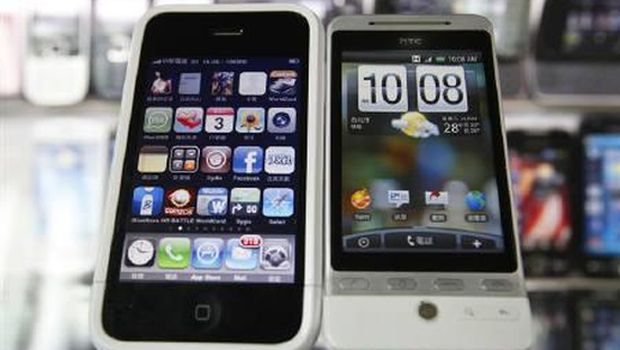
An HTC smartphone, right, and an Apple iPhone are seen on display at a mobile phone shop in Taipei, on March 3, 2010. (Reuters/Nicky Loh/files)
Riyadh, Asharq Al-Awsat—Saudi cellular phone operator Mobily and Taiwanese smartphone maker HTC have entered into a strategic partnership in a bid to book a larger slice of the rapidly growing Saudi smartphone market from rivals Apple and Samsung.
Speaking to Asharq Al-Awsat at a press conference on Monday to announce the partnership and the launch of HTC’s new smartphone model, the HTC One M8, Sami Nashwan, chief consumer officer for Mobily, said: “The development of this strategic partnership with HTC in a number of areas reflects both companies’ ambitions to launch new products for the future and to capitalize on the growth and the developments the sector has seen recently and which will shape where it is going in the coming years.”
Also speaking to Asharq Al-Awsat about the partnership, Mobily’s vice-president for marketing consumer acquisitions, Ali Al-Dakheel, said the cellular operator had “wide-ranging experience in marketing smartphones which will really compete in the market. We were one of the first companies to launch the [Apple] iPhone in the Saudi market, which achieved very high sales.”
HTC is attempting to challenge Samsung and Apple in gaining a larger slice of the smartphone pie in the Middle East, and in Saudi Arabia in particular. Apple’s iPhone currently accounts for 35 percent of the region’s smartphone market, according to research by tech giant Google, with the larger share—45 percent—going to Android-operated smartphones such as HTC and Samsung models. A number of recent entrants to the smartphone market including Sony and Huawei have also provided added competition.
According to Google’s research, Saudi Arabia currently has the third-highest smartphone penetration rate in the world, with 72.8 percent of the population owning a device of this type. In 2008–2009, that figure hovered around the 30–34 percent mark.
Dakheel added that Mobily currently possesses the largest broadband customer base in the entire Middle East, “making it the ideal partner for smartphone makers who wish to market their products to the Saudi market.” Research by Cisco Systems suggests most data traffic from smartphones will be offloaded from the devices themselves, with users utilizing high-speed broadband Wi-Fi networks at home. Data from Google’s research suggests 93 percent of Middle-East smartphone owners use their phones at home, accessing the internet on their devices through a home network.
The Middle East as a whole also constitutes a highly lucrative market for smartphone manufacturers. According to Google’s research, the UAE has the highest smartphone penetration rate globally—ahead of South Korea and Saudi Arabia respectively—at 73.8 percent.
And the region is set to challenge India and China in leading the global smartphone market in the coming years. Cellular data traffic in the Middle East and North Africa region is expected to grow 77 percent between now and 2017—faster than in any other part of the world—and will account for 18.7 percent of all traffic by then, the second-highest contributor after the Asia Pacific region, at 47.1 percent.
